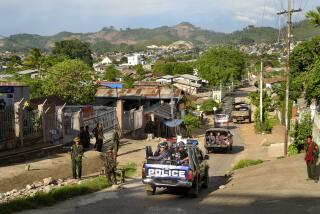Yugoslav Forces Take Ghost Town From Kosovo’s Rebels
- Share via
MALISEVO, Yugoslavia — The government Wednesday displayed its biggest trophy from five months of fighting in Kosovo province--a ghost town that until a day earlier had been the stronghold of armed ethnic Albanian separatists.
In a massive but apparently orderly withdrawal, the rebels and the last of 35,000 or more ethnic Albanian inhabitants left Malisevo a few hours before Tuesday’s arrival of Serbian paramilitary police and Yugoslav army tanks.
Mazrek Jaha, 80, the only Albanian seen in the town Wednesday, said the retreat from a 5-day-old government assault was bloodless.
“They heard explosions from over there,” he said, leaning on his cane and pointing toward hills on the eastern horizon. “Then they left. Ran away to the woods. All of them.”
The loss of Malisevo was a staggering, but not fatal, blow to the Kosovo Liberation Army. It marched unchallenged into this placid farming town three months ago and turned the place into a bustling military headquarters and logistic center for the world’s fastest-growing guerrilla force--one that eventually overextended itself.
Equally remarkable was the civilian exodus, the largest single displacement of people since the conflict began. Until this week, the fighting had made 147,000 people homeless, including 40,000 who have left the province, according to U.N. figures. Much of Malisevo’s population had been displaced by fighting elsewhere.
One foreign official said he saw “tractor load after tractor load” of displaced people moving Wednesday through the Drenica Valley, about 10 miles to the north, but others were seen heading south and still others were believed to be sleeping nearby in the forests.
The flight was not surprising in light of past police behavior. Most of Kosovo’s 1.8 million ethnic Albanians, who outnumber Serbs in the province 9 to 1, back the rebels’ demand for independence from Serbia, the dominant republic of the Yugoslav federation. Since fighting began last winter, government forces have shelled, looted and burned parts of nearly every village they have occupied. More than 400 people have been killed.
But Malisevo was surprisingly intact Wednesday.
There were no bullet-scarred walls, little spent ammunition. The closest war damage was a fire-blackened three-story house just north of town where some guerrillas made a last stand against advancing government troops. Its roof was blown off.
A few shops in town--including ones selling compact discs, automobile parts, jewelry and watermelons--had been broken into and partially looted. But the other stores and cafes, as well as the homes, were locked and shuttered, with curtains drawn--signs of orderly civilian departure.
The guerrillas had time to empty their safe. Aside from a satellite dish and the sewing machines used to stitch insignia on their uniforms, they left nothing much of value at staff headquarters. The place was a mess, though, strewn with beer bottles, gasoline cans and discarded food boxes labeled as humanitarian aid from the Norwegian Red Cross.
“They are not a strong, well-organized army,” said Maj. Bozidar Filic, a Serbian police officer. “As soon as their first line of defense broke, they ran away from the center of what they used to call their independent state. We never expected it would be so easy.”
Malisevo began to look vulnerable last weekend when government forces launched their broadest offensive of the conflict.
The rebels’ hold on the town and much of central Kosovo was dependent on their control, since May 12, of the province’s main east-west highway, linking Pristina, the provincial capital, with the second-biggest city, Pec. That, in turn, required Yugoslav President Slobodan Milosevic’s restraint, under international pressure led by the United States, in keeping the federal army out of the fray, except near Kosovo’s borders.
But on Monday, police backed by dozens of tanks blasted away rebel barricades and reopened the road.
As the army moved 50 trucks and a train with 16 tanks toward scattered rebel concentrations Wednesday, a senior Western diplomat said he viewed the army’s new role “with growing concern.”
The United States last spring threatened military intervention in Kosovo to curb Milosevic’s crackdown. As the rebel movement mushroomed to as many as 20,000 fighters, Washington switched to a policy of pressing both sides to negotiate a cease-fire.
But a U.S. effort to forge a broad-based ethnic Albanian team for peace talks appeared to stall Wednesday in the face of the government offensive.
“It has put people in a somewhat grouchy mood,” the diplomat told reporters in Pristina.
More to Read
Sign up for Essential California
The most important California stories and recommendations in your inbox every morning.
You may occasionally receive promotional content from the Los Angeles Times.













